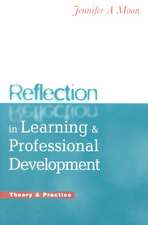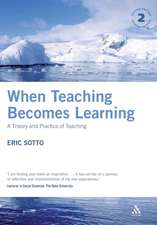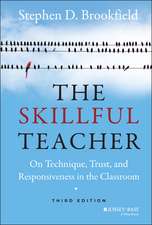Teaching Naked: How Moving Technology Out of Your College Classroom Will Improve Student Learning
Autor JA Bowenen Limba Engleză Paperback – 21 oct 2012
Preț: 161.21 lei
Nou
Puncte Express: 242
Preț estimativ în valută:
30.85€ • 32.29$ • 25.52£
30.85€ • 32.29$ • 25.52£
Carte disponibilă
Livrare economică 17-31 martie
Livrare express 01-07 martie pentru 28.70 lei
Preluare comenzi: 021 569.72.76
Specificații
ISBN-13: 9781118110355
ISBN-10: 1118110358
Pagini: 352
Dimensiuni: 159 x 227 x 25 mm
Greutate: 0.43 kg
Ediția:Firsttion.
Editura: JOSSEY BASS
Locul publicării:Hoboken, United States
ISBN-10: 1118110358
Pagini: 352
Dimensiuni: 159 x 227 x 25 mm
Greutate: 0.43 kg
Ediția:Firsttion.
Editura: JOSSEY BASS
Locul publicării:Hoboken, United States
Public țintă
Faculty and administrators in higher education, including teaching and learning center directors and staffCuprins
Preface ix
About the Author xxi
PART I: The New Digital Landscape 1
1. The Flat Classroom and Global Competition 3
2. Social Proximity and the Virtual Classroom 27
3. Games, Customization, and Learning 51
PART II: Designing 21st-Century Courses 73
4. Designing College More Like a Video Game 75
5. Technology for Information Delivery 103
6. Technology for Engagement 129
7. Technology for Assessment 153
8. The Naked Classroom 185
PART III Strategies for Universities of the Future 215
9. The Educational Product in the Internet Age 217
10. The Naked Curriculum 243
11. The Naked Campus 267
Bibliography 289
Index 315
Notă biografică
José Antonio Bowen is dean of the Meadows School of the Arts, Algur H. Meadows Chair, and professor of music at Southern Methodist University in Dallas, Texas.
Recenzii
“This is an important book. Everyone who is concerned about the future of higher education should read it. In a highly readable and lively style, Bowen makes the most intelligent argument I’ve encountered about how we should think about teaching and learning and emerging technologies. It is also a powerful guide to more effective teaching and deeper learning.”
—Ken Bain, provost and vice president for Academic Affairs and professor of history and urban education, University of the District of Columbia; and author, What the Best College Teachers Do
“Teaching Naked is a persuasive proposal for using technology outside the classroom to free up time inside the classroom for more meaningful student-faculty interaction. Insightful and provocative, it is filled with practical advice for teachers, administrators, and institutions on how to navigate the revolutionary present in order to remain relevant for the future.”
—Elizabeth Barkley, professor of music, Foothill College, and author, Student Engagement Techniques and Collaborative Learning Techniques
“This is one of the most exciting books I have read in a long time. I could not stop sharing quotes from it with my wife, also an educator, while reading it. It provides incredible insight and foresight in a fresh and bold analysis of what we could be doing and should be doing with technology in higher education.”
—L. Dee Fink, author, Creating Significant Learning Experiences
Descriere
Introducing a new way to think about higher education, learning, and technology that prioritizes the benefits of the human dimension. José Bowen recognizes that technology is profoundly changing education and that if students are going to continue to pay enormous sums for campus classes, colleges will need to provide more than what can be found online and maximize “naked” face-to-face contact with faculty. Here, he illustrates how technology is most powerfully used outside the classroom, and, when used effectively, how it can ensure that students arrive to class more prepared for meaningful interaction with faculty. Bowen offers practical advice for faculty and administrators on how to engage students with new technology while restructuring classes into more active learning environments.











